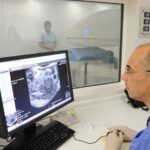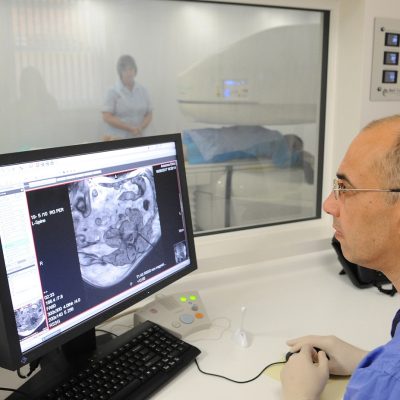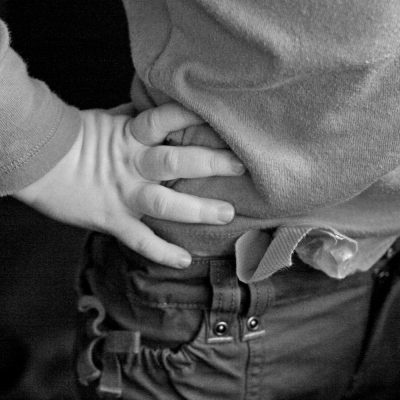Neque porro quisquam est qui dolorem ipsum quia dolor sit amet, consectetur, adipisci velit
Spinal discs are also called intervertebral discs. There is a spinal disc between each bone (vertebra) in your spine. This keeps the vertebrae separated and acts as a shock absorber. A spinal disc is a little like a jelly donut, with a softer center (nucleolus pulposus) encased within a tougher exterior ( annulus fibrosus). Disc herniation, sometimes called a slipped disk, is displacement of the disc nucleus pulposus, parts of the annulus fibrosus and cartilage, beyond the limits of the intervertebral disc space
Disc herniation is most often the result of a gradual, aging-related wear and tear called disc degeneration. As you age, your spinal discs lose some of their water content. That makes them less flexible and more prone to tearing or rupturing with even a minor strain or twist. Some people are more prone for disc herniation than others. Overweight causes extra stress on the discs in your lower back. Those with physically demanding jobs requiring repetitive lifting, pulling, pushing, bending sideways and twisting have a higher risk of a herniated disc and some people inherit a predisposition to developing disc herniation. Most people can’t pinpoint the exact cause of their herniated disc and you also can have a herniated disk without knowing it.
A herniated disc can irritate nearby nerves and result in pain, numbness or weakness in an arm or leg. The most common nerve pain caused by disc problems is sciatica – where the affected disc presses on your sciatic nerve, causing pain radiating into your leg. This nerve travels from your spine to your hip and buttock and down your leg. The pain can be sudden and sharp, and move down the nerve to your leg and sometimes down to your foot. Just below your waist, the spinal cord separates into a group of long nerve roots (cauda equina) that resemble a horse’s tail. Rarely, disc herniation can compress the entire cauda equina. If this happens emergency surgery may be required to avoid permanent weakness or paralysis.
Depending on your symptoms and signs you may need imaging by an MRI scan (magnetic resonance imaging) to confirm the diagnosis and decide on the best treatment. This will be essential if your symptoms suggest cauda equina compression.
The outlook of disc herniation is good for most people. Many people experience no symptoms from a herniated disk. For those who develop symptoms, the initial treatment is usually anti-inflammatory pain killer and an advice about simple back exercises to keep you as normally active and mobile. If the pain or any restrictions caused by the problem with your back last for more than 1-2 weeks the treatment options include physiotherapy and referral to a specialist for an epidural or nerve root corticosteroid injection if there is associated sciatic pain. A nerve root injection is a selective injection of drugs (usually a combination of steroids and local anaesthestic) around a specific nerve as it leaves the spine. Steroid is anti-inflammatory medicine. The injection is performed in order to get drugs, such as steroids, as close to the nerve roots as possible. It serves two purposes. One is diagnostic to isolate the nerve causing the pain. The second is to reduce the pain and nerve swelling. Many prolapsed disc shrink and heal and thus potentially avoiding surgery.
In some selective cases, surgery to remove the herniated disc may be required. Some people will continue to have pain for longer than one year and sometimes much longer. This tends to be worse for people who initially have more severe pain and have a greater restriction of daily activities. Pressure on the nerves may cause permanent nerve damage. The pain and restrictions may lead to psychological and social problems – for example, depression and being unable to continue with socialising and hobbies. The pain and restrictions may also prevent you from working. If this happens, you may require the support of a pain management consultant and a psychologist.
You may help prevent suffering a herniated disc by undertaking regular Exercise to strengthen the trunk muscles to stabilize and support the spine and by maintaining a good posture and a healthy weight
Avicenna clinic specialize in spinal condition and back pain. , The clinic has a range of specialist consultants, operating theatre for surgical procedures and superior in-house imaging facilities –including state-of-the-art MRI, ultrasound and X-ray scanning equipment. We can assess and diagnose all cases of acute and chronic pain quickly and deliver comprehensive treatment plans tailored to you.
To book a consultation or for more information on treating your pain and explore the other available services to help you, contact Avicenna Clinic on 0330 202 0597.












